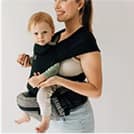How To Cope With Postpartum & Maternal Separation Anxiety
Written by Katy Arnold on January 11, 2023.
Leaving your baby, even briefly, can feel like leaving your heart behind. Postpartum separation anxiety can crop up in the early days of parenting, and further down the line, maternal separation anxiety can add another layer of emotional complexity.
The first step in tackling it is to acknowledge those feelings. A little worry is normal, but prolonged or intense worry may signal that something’s offbeat. This blog dives into the signs of postpartum and maternal separation anxiety, and offers practical tips to help you navigate this stage while supporting your well-being.
Table of Contents
- What is Postpartum Separation Anxiety?
- What is Maternal Separation Anxiety?
- Postpartum and Maternal Separation Anxiety Symptoms
- Tips on How to Cope with Separation Anxiety
- How Long Does Separation Anxiety Last?
- FAQs on Postpartum and Maternal Separation Anxiety
What is Postpartum Separation Anxiety?
Postpartum separation anxiety is an extreme worry, fear, or distress that hits when you’re away from your baby. It’s not just about missing them; it’s often the primal protectiveness that makes leaving them, even briefly, feel overwhelming. This anxiety in moms is often powered by exhaustion, hormonal shifts, and the fierce love you have for your baby.
What is Maternal Separation Anxiety?
Maternal separation anxiety happens when a mother feels intense worry, guilt, or sadness about being away from their child. Unlike postpartum or newborn separation anxiety, which often appears in the early months due to hormonal shifts and the whirlwind of new motherhood, maternal separation anxiety can show up at any stage of parenting.
Signs include mood swings, difficulty focusing, and disrupted sleep. It’s natural to care deeply about your child, but when those feelings become excessive, they can start to affect your daily life and emotional health.
Postpartum and Maternal Separation Anxiety Symptoms
Separation anxiety in moms can show up in many ways, but some common symptoms are easy to recognize. Whether it’s postpartum separation anxiety in the early days, or maternal separation anxiety that emerges later, here’s what to look for:
- Excessive worry: Constantly imagining “what if” scenarios, even when there’s no real danger.
- Catastrophic thoughts: Jumping to worst-case conclusions, like assuming the worst if a caregiver doesn’t answer your call.
- Irritability or anger: Feeling unusually short-tempered or overwhelmed by minor frustrations.
- Guilt: Struggling with unease or guilt when leaving your baby with someone else, even briefly.
- A need for control: Feeling compelled to manage every detail of how your baby is cared for to ease your mind.
Separation anxiety in moms can also manifest as nausea, a racing heart, headaches, or episodes of panic.
Tips On How to Cope with Separation Anxiety
Separation anxiety, whether postpartum or maternal, can be tough—but will get easier with time and the right coping techniques. If you’re wondering how to cope, these tips can help you manage your emotions, take small steps forward, and find balance.
Start small
When figuring out how to cope with baby separation anxiety, begin with short separations—like a quick walk around the block or a solo coffee run. Gradually extend the time apart as you and your baby get more comfortable.
Name your feelings
Acknowledge what you’re experiencing. Whether it’s maternal separation anxiety or postpartum emotions, talking with someone you trust can help you process and take control.
Take time for yourself
One of the most important steps in how to cope with postpartum and maternal anxiety is prioritizing self-care. Whether it’s a short break or a longer outing, doing something for you is essential to recharge and show up better for your baby.
This could include figuring out what to wear postpartum. Choosing clothes that fit your new body and make you feel good is a simple way to boost your comfort and confidence—helping you navigate new parenthood with a little more ease.
Be patient
So, when does separation anxiety end? The truth is, it’s different for everyone, but it does ease with time. Take small steps and know that progress is still progress.
Seek professional help
If you’re looking for how to get rid of separation anxiety and it’s feeling unmanageable, a mental health professional can help you navigate these feelings and find strategies that work.
Build trust with caregivers
Spending time getting to know the people caring for your baby can make stepping away feel less daunting. The more confident you are in their abilities, the easier it is to let go.
Prepare your caregivers
When leaving your child with others, it can be comforting to prepare other caregivers for things to expect or ways that you typically soothe or care for your baby. This is where having your adjustable Tushbaby Carrier will come in handy. You can show the caregiver how to adjust and wear the carrier for both carrying and feeding support. Keep some necessities in the five storage pockets so they’ll have everything they need—you can even stash a foldable Changing Pad in your Tushbaby for on-the-go diaper emergencies.
Your baby is likely comforted by the Tushbaby if you use it at home, so knowing they’ll be treated the same when you’re away can be comforting to you. Tushbaby also designs a sleek crossbody bag, The Pack, so you can bring any extras needed to care for your baby (and yourself) and keep them happy in style. Plus, The Pod pacifier pouch can be clipped to The Pack to keep your little one’s paci close and clean.
Separation anxiety doesn’t last forever, and it doesn’t mean you’re doing anything wrong. It’s just part of the journey—and with time, patience, and support, it will get easier.
How Long Does Separation Anxiety Last?
The duration of postpartum and maternal separation anxiety varies from person to person. For some, it may ease within a matter of months, especially as they adjust to new routines and gain confidence in their child’s caregivers. For others, it can take a little longer.
With time, support, and the right coping strategies, separation anxiety typically becomes more manageable. If it feels overwhelming or prolonged, reaching out to a therapist can help.
FAQs on Maternal and Postpartum Separation Anxiety
Is it normal to have separation anxiety after stopping breastfeeding?
Yes, separation anxiety can happen after you stop breastfeeding. This transition can bring up a mix of emotions—sadness over the end of a bonding routine, worry about your baby adjusting, or even questioning your decision.
Breastfeeding often creates a deep connection, and shifting away from that can feel like a big change for you and your baby. Remember, your bond goes beyond feeding, and it’s okay to feel this way. These emotions tend to ease with time, but if the anxiety feels overwhelming, talking with a trusted friend, partner, or therapist can help.
What triggers postpartum anxiety?
Postpartum anxiety can be triggered by a range of factors, from the dramatic hormonal shifts after birth to the instinctive protectiveness we’re hardwired to have, or even the pressure to “do it all” for your baby as a parent.
Is separation anxiety normal for new moms?
Yes, separation anxiety is completely normal for new moms. Becoming a parent comes with an overwhelming mix of love, responsibility, and protectiveness, which can make being apart from your baby feel incredibly difficult.
Separation anxiety, whether postpartum or maternal, is a natural part of parenting—but it doesn’t have to define your journey. By recognizing your feelings, taking small steps, and leaning on support, you can navigate this stage more easily and confidently. Remember, these emotions are temporary; with time and care for yourself, they’ll become more manageable. You’ve got this—and you’re not alone.
Support your parenting journey with Tushbaby’s smart, stylish products—shop now to discover comfort and convenience for you and your baby.









Leave a comment